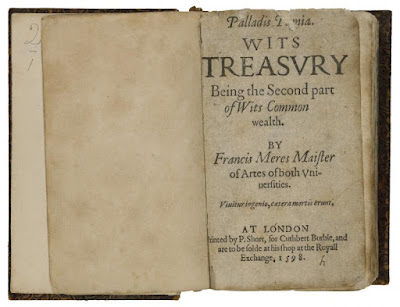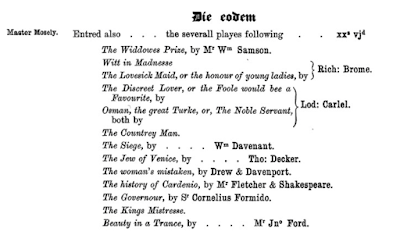What do we know about Shakespeare's lost plays?
It's frequently said that Shakespeare wrote 37 plays and collaborated on more. But 2 of his plays are lost: that is, we know they were written, but no copies of them survive (at least, that we have discovered and identified yet). Let's dive into what we know and what we don't know about Shakespeare's lost plays.
* indicates that the original spelling has been translated into modern English spelling for readability.
What are they?
The two plays are Love's Labour's Won, written before 1598, and The History of Cardenio, written in 1612 or 1613.
How do we know they exist?
Love's Labour's Won is listed as an example of Shakespeare's comedies in the 1598 book Palladis Tamia: Wits Treasury by English author Francis Meres. In his chapter "A comparative discourse of our English Poets, with the Greek, Latin, and Italian Poets,"* Meres includes William Shakespeare, along with six examples of Shakespeare's tragedies and six of his comedies. Love's Labour's Won appears on the brief list of comedies, indicating that it was written by Shakespeare before 1598. Palladis Tamia also gives us other pieces of historical information about Shakespeare and his works. It is the first work to cite Shakespeare as an author of sonnets––which indicates that Shakespeare's sonnets must have already been in circulation before the collection of 154 sonnets was published in 1609. Likewise, Palladis Tamia tells us that all 12 plays cited by Meres must have been written before 1598. This includes two plays that were not printed until they appeared in the First Folio in 1623: Two Gentlemen of Verona and The Comedy of Errors.
 |
| Image credit: Shakespeare Documented, Folger Shakespeare Library. |
The History of Cardenio is attributed to William Shakespeare and John Fletcher in the 1653 Stationer's Register, a record book kept by the Stationer's Company in London.
 |
| Image credit: Columbia University Libraries. |
What are they about?
Some scholars think that Love's Labour's Won is a sequel to Love's Labour's Lost. Though this is an attractive idea, historical tradition may suggest otherwise: Elizabethan playwrights rarely wrote sequels to comedies. Others believe that it is an alternative name to a Shakespeare play that survives today, such as The Taming of the Shrew or Much Ado About Nothing.
Most scholars believe that the The History of Cardenio has for its source material the 1605 novel Don Quixote by Miguel de Cervantes. The timing of this hypothesis checks out, as the first English translation of Don Quixote (translated by Thomas Shelton) was published in 1612, and thus would have been accessible to Shakespeare and Fletcher. If it were based on the episode of Cardenio in Don Quixote, the reasons it might appeal to Shakespeare are pretty clear. Cervantes evokes many of the tropes that Shakespeare uses in his plays: secret love, plotting, madness, maidens disguised as young boys, and reconciliation. In fact, the Cardenio episode in Don Quixote bears remarkable similarity to Two Gentlemen of Verona.
Do any parts of these plays survive?
If Love's Labour's Won was its own play, no parts of it are believed to survive. Of course, if Love's Labour's Won was an alternative title for a known Shakespeare play, the entire play survives.
The History of Cardenio, however, may survive in bits and pieces––that is, in two plays and a song.
The first possible play is The Second Maiden's Tragedy (1611). While generally attributed to Thomas Middleton, the play may have been written or revised by Shakespeare. In 1994, handwriting expert Charles Hamilton claimed that the entire play was written by Shakespeare––and that this play is The History of Cardenio. Most scholars have rejected both of those theories. But the manuscript contains slips of paper, added afterwards, in a handwriting that some scholars think resembles that of Shakespeare.
 |
| Image credit: Shakespeare Documented, Folger Shakespeare Library. |
The second play linked to The History of Cardenio is Double Falsehood (1727). On the first page, the play purports to be an adaptation by Lewis Theobald of William Shakespeare's The History of Cardenio. Since the publication of Double Falsehood, scholars have used various methods of linguistic analysis to try to determine if Shakespeare contributed at all, and, if so, how much. As of now, Shakespeare's contribution is highly contested.
 |
| Image credit: BBC News. |
The song "Woods, Rocks, and Mountains," set to music by Robert Johnson, may come from The History of Cardenio.



One theory is that 'Love's Labours Won' is an alternative title for 'All's Well That Ends Well'
ReplyDelete